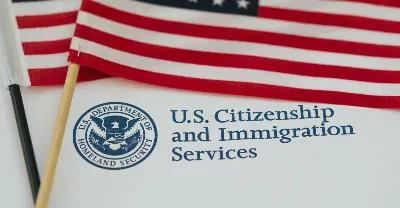Key Highlights
- 1. Why the Test Is Considered “Too Easy”
- 2. Proposed Revisions: Essays, Standardisation, and More
- 3. Resuming Neighbourhood Interviews
- 4. The Enforcement Shift: “War on Fraud”
- 5. The Bigger Context: Aligning with Broader Immigration Stance
- 6. Potential Impacts on Immigrants and the System
- Conclusion
The United States naturalisation procedure is about to have a brutal makeover. Invoking the argument that the existing citizenship exam does not sufficiently test civic knowledge, the Trump administration, acting via USCIS Director Joseph Edlow, proposes a much rougher test. They will offer a transition away from memorising facts to a higher level of understanding and constitutional loyalty, so officials will include essays, standardised tests, and even interviews with neighbours to make sure that new Americans are genuinely committed to American democratic values.
1. Why the Test Is Considered “Too Easy”
The current design, requiring that an applicant get 6 out of 10 questions correct on a list of 100, is insufficient to assess true civic engagement, according to Edlow, who described the situation at a meeting of the Centre for Immigration Studies. He claims that many applicants are merely trained to pass through sheer memorisation of the material they are coached to pass, instead of instilling certain ideals like the Constitution, civic obligations, and democratic obligations.
The present test uses simple questions, such as giving two examples of federal holidays or which is the branch of government that Congress is. One of the questions that Edlow rejected was that it was simply not enough. He emphasised that it was necessary to dig deeper and learn whether the applicants are attached to the Constitution.
Also Read: US Visitor Visa B1/B2
2. Proposed Revisions: Essays, Standardisation, and More
Instead of straightforward multiple-choice questions, the overhaul as proposed would mean an essay test, where the applicants would be requested to explain what American citizenship means to them. This is to evaluate both contemplation and attachment to the nation, not mere recollection of facts.
Moreover, USCIS can implement a more standardised testing methodology to improve the understanding of civic knowledge. Although it remains accessible, the revamp will make the test more thought-provoking.
3. Resuming Neighbourhood Interviews
A more important step involves a return to a practice that had been phased out in the George H.W. Bush era, interviewing neighbours, coworkers or community members to certify to good moral character and to attachment to the Constitution. This close-up approach is used to substantiate conduct, place of residence, and citizenship of an applicant as one instance within an overall discretionary assessment.
New internal USCIS guidance has ended the old blanket waiver by applying these checks on a case-by-case basis. To reduce the back-and-forth delays, applicants can also take the initiative and add testimonial letters to support their application.
Also Read: Intracompany Transfer Visa USA
4. The Enforcement Shift: “War on Fraud”
Edlow described these developments as a war on fraud and indicated a larger redefinition of the USCIS mission as a service-oriented rather than an enforcement-minded agency. The objective: to have only the truly qualified applicants become citizens of the U.S. Not easily should it be obtained... USCIS is in the process of revamping the civics test and the process overall, spokesman Matthew Tragesser said.
In order to complement these process changes, USCIS has been planning to reinforce its law-enforcement capacities with the deployment of its own special team of special agents. They will also be tasked with identifying fraudulent applications and performing further investigations, where appropriate.
5. The Bigger Context: Aligning with Broader Immigration Stance
This redo fits into a broader context of a hard immigration stance of the Trump administration. It comes after more ICE raids, deportations and attempts to strengthen the test of good moral character. It is important to note that the USCIS has noted an increase in the cases of denaturalisation, 11 cases per year (19902017) to 42 cases per year since Trump became president, which indicates a more active approach to revocation of citizenship in the cases of fraud.
Also, Edlow repeats his prior argument and that of others that the naturalisation process is inadequate as a way to show the constitutional loyalty that Congress hoped U.S. citizens would reflect.
6. Potential Impacts on Immigrants and the System
Assuming its enforcement, the suggested changes present new challenges to potential citizens, particularly non-English or disadvantaged ones. Cultural and social obstacles that were not observed before in the system evaluation process may be introduced either by the essay requirement or interviews with the neighbours.
There is a positive side to this, though. The proponents believe that with these deeper checks, there is a stronger civic connection between the immigrants and their new country; they know not only the rights of the U.S., but they also know the responsibilities as well.
Also Read: Difference Between B1 and B2 Visa USA: Experts New Guide
Conclusion
Under the Trump administration, the USCIS director Joseph Edlow continues to drive the citizenship process to become more scrutinised and civic-oriented. The overhaul will raise the naturalisation bar, as it will tackle an overly easy civics test, propose essay formats, reinstitute neighbourhood interviews, and increase fraud enforcement. It remains to be seen whether this new framework will result in more integrated citizens or new obstacles. One thing is sure, though: American citizenship is no longer going to be disposed of.
Contact TerraTern for more information.








